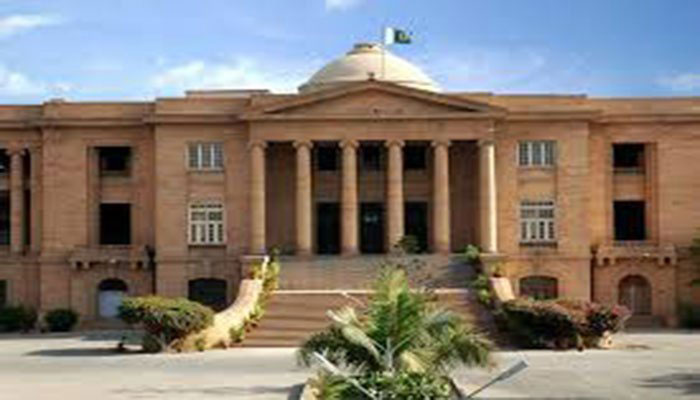SHC observes water board prima facie did not implement SC’s orders to remove illegal hydrants
The water tanker mafia sprung up in Karachi as the Karachi Water and Sewerage Board (KWSB) failed to meet the water needs of the city.
This observation was made by the Sindh High Court on Wednesday as it heard a petition with regard to the award of contracts in respect of six official hydrants in the city by the KWSB. A division bench of the SHC comprising Justice Mohammad Shafi Siddiqui and Justice Adnan-ul-Karim Memon observed that the basic duty of the KWSB was to supply water to the
citizens of Karachi.
The petitioner, Sardar Abdul Hameed, had sought an injunction with regard to six official hydrants as he requested the high court to ensure that the contractors would take into account all the rules required to be followed in respect of supplying water either to the general public or on a commercial basis.
The SHC was informed that the petitioner was not a successful bidder and the tenders in respect of all those hydrants had been awarded to individual contractors who had their independent tankers to cater to the requirement in terms of the rules.
A counsel for the KWSB submitted that water to the general public was being supplied through an app on the basis of which requirement was being calculated, whereas the official supply was also being made through these contractors. He submitted that the petitioner was neither a successful bidder nor a contractor to fill his own tankers to supply water according to his desire and demands.
The KWSB’s counsel, however, submitted that all the rules required in this regard were being implemented in the letter and spirit and in case the KWSB found out that any of its contractors was violating any rule, including the requirement of the tanker in terms of capacity, those rules would be enforced.
The high court observed that there have been certain directions of the Supreme Court for closing of illegal hydrants in Karachi but prima facie the KWSB had failed to remove illegal hydrants operating in the city.
The SHC observed that the apex court had already directed that KWSB to focus on their core operations to provide portable water through a regular distribution network and even if hydrants were needed, there should be a rational and scientific study to evaluate the need for hydrant services in water-scarce areas.
The bench observed that hydrant services preferably should supply water to improvised populations and the judiciary had already settled the issue in this regard. The SHC disposed of the petition with a direction to the water board to ensure that its rules, which the individual contractors of different hydrants were supposed to adhere to, were followed.
-
 Prince William On Verge Of Breakdown Because Of 'disgraced' Andrew
Prince William On Verge Of Breakdown Because Of 'disgraced' Andrew -
 Tig Notaro Reflects On Oscar Nod For 'Come See Me In The Good Light': 'I Was Sleeping'
Tig Notaro Reflects On Oscar Nod For 'Come See Me In The Good Light': 'I Was Sleeping' -
 Kenyon Sadiq Sets 40-yard Dash Record At NFL Scouting Combine, Eyes First Round
Kenyon Sadiq Sets 40-yard Dash Record At NFL Scouting Combine, Eyes First Round -
 Talk Show Host Drops Hint About Taylor Swift, Travis Kelce Wedding Date
Talk Show Host Drops Hint About Taylor Swift, Travis Kelce Wedding Date -
 Andrew Scandal Brings New Worries For Prince Harry, Meghan Markle
Andrew Scandal Brings New Worries For Prince Harry, Meghan Markle -
 King Charles Imposes New Restrictions On Ex-Prince Andrew In Surprise Move
King Charles Imposes New Restrictions On Ex-Prince Andrew In Surprise Move -
 Chris Hemsworth Reveals How Elsa Pataky Guides His Career Moves
Chris Hemsworth Reveals How Elsa Pataky Guides His Career Moves -
 Was Travis Barker In A Relationship With Kim Kardashian Before Marrying Her Sister?
Was Travis Barker In A Relationship With Kim Kardashian Before Marrying Her Sister? -
 Brad Pitt Feeling Down In The Dumps After Kids' Snubs As Pals Continue To Paint Angelina Jolie A Villain
Brad Pitt Feeling Down In The Dumps After Kids' Snubs As Pals Continue To Paint Angelina Jolie A Villain -
 Ex-PM Speaks Out On Andrew Mountbatten-Windsor In Newspaper Column
Ex-PM Speaks Out On Andrew Mountbatten-Windsor In Newspaper Column -
 Eric Dane Remembered In Glowing Tribute By Trans Activist In 'Grey's Anatomy'
Eric Dane Remembered In Glowing Tribute By Trans Activist In 'Grey's Anatomy' -
 Zach Braff, Sarah Chalke Explain J.D. And Elliot Twist In 'Scrubs' Revival
Zach Braff, Sarah Chalke Explain J.D. And Elliot Twist In 'Scrubs' Revival -
 Jim Carrey's Death To Body Double: Comedian's Latest Appearance Sparks Conspiracy Theories
Jim Carrey's Death To Body Double: Comedian's Latest Appearance Sparks Conspiracy Theories -
 Aespa's Ningning Steals Spotlight With Hilarious Viral Video From Milan Fashion Week
Aespa's Ningning Steals Spotlight With Hilarious Viral Video From Milan Fashion Week -
 Should Benedict Be Forgiven For Mistress Question? 'Bridgerton' Star Yerin Ha Reveals
Should Benedict Be Forgiven For Mistress Question? 'Bridgerton' Star Yerin Ha Reveals -
 John F. Kennedy Jr. Wife Carolyn Bessette's Last Minute Bridal Crisis Revealed
John F. Kennedy Jr. Wife Carolyn Bessette's Last Minute Bridal Crisis Revealed




